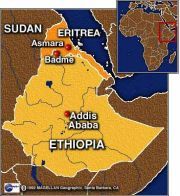UN pressures Ethiopia to accept border decision
By Ed Harris
ASMARA, July 12 (Reuters) – The United Nations Security Council has urged Ethiopia to accept a binding ruling on its border with Eritrea, the root of an increasingly hostile stalemate between the two foes since a 1998-2000 war.
 The two Horn of Africa neighbours, who lost 70,000 people in their border war, have been deadlocked since 2002, when Ethiopia refused to accept an independent boundary commission’s awarding of a flashpoint town to Eritrea.
The two Horn of Africa neighbours, who lost 70,000 people in their border war, have been deadlocked since 2002, when Ethiopia refused to accept an independent boundary commission’s awarding of a flashpoint town to Eritrea.
This year, senior U.N. and Eritrean government officials have both warned the stalemate is unsustainable, raising fears of renewed conflict.
“Members of the council note with deep concern the continued lack of progress in the implementation of the final and binding decision … and urge Ethiopia to accept fully,” the Security Council said in a statement issued late on Monday.
Under terms of a 2000 peace agreement that ended the frontier conflict, both sides agreed to accept a “final and binding” decision on where the border should be.
But when the boundary commission awarded the town of Badme to Eritrea in 2002, Ethiopia refused to accept it.
Last year, Ethiopia said it accepted the decision in principle but wanted dialogue with Asmara first.
Eritrea refused, and reiterated its longstanding position that Ethiopia was legally bound to accept the ruling. It has since complained that the international community is doing little to pressure its larger neighbour into compliance.
The Security Council also expressed concern about recent shootings in the 25-km wide, UN-patrolled demilitarised zone that runs along the inside of Eritrea’s southern boundary.
Four Ethiopians and one Eritrean militiaman were killed in three separate incidents in April between alleged Ethiopian armed men and Eritrean militiamen, a June U.N. report said.
“(The Security Council members) call on both parties to refrain from any action which may lead to an escalation of the tension,” said the report.
It also objected to the “continuing high concentration of troops” in areas next to the demilitarised zone, an apparent reference to Ethiopia’s movement of as many as 48,000 troops closer to the border in December.
Possible options to resolve the stalemate in the peace process include, when appropriate, a visit to Ethiopia and Eritrea, as well as a meeting of the witnesses to the December 2000 peace agreement signed in Algiers, the U.N. said.
